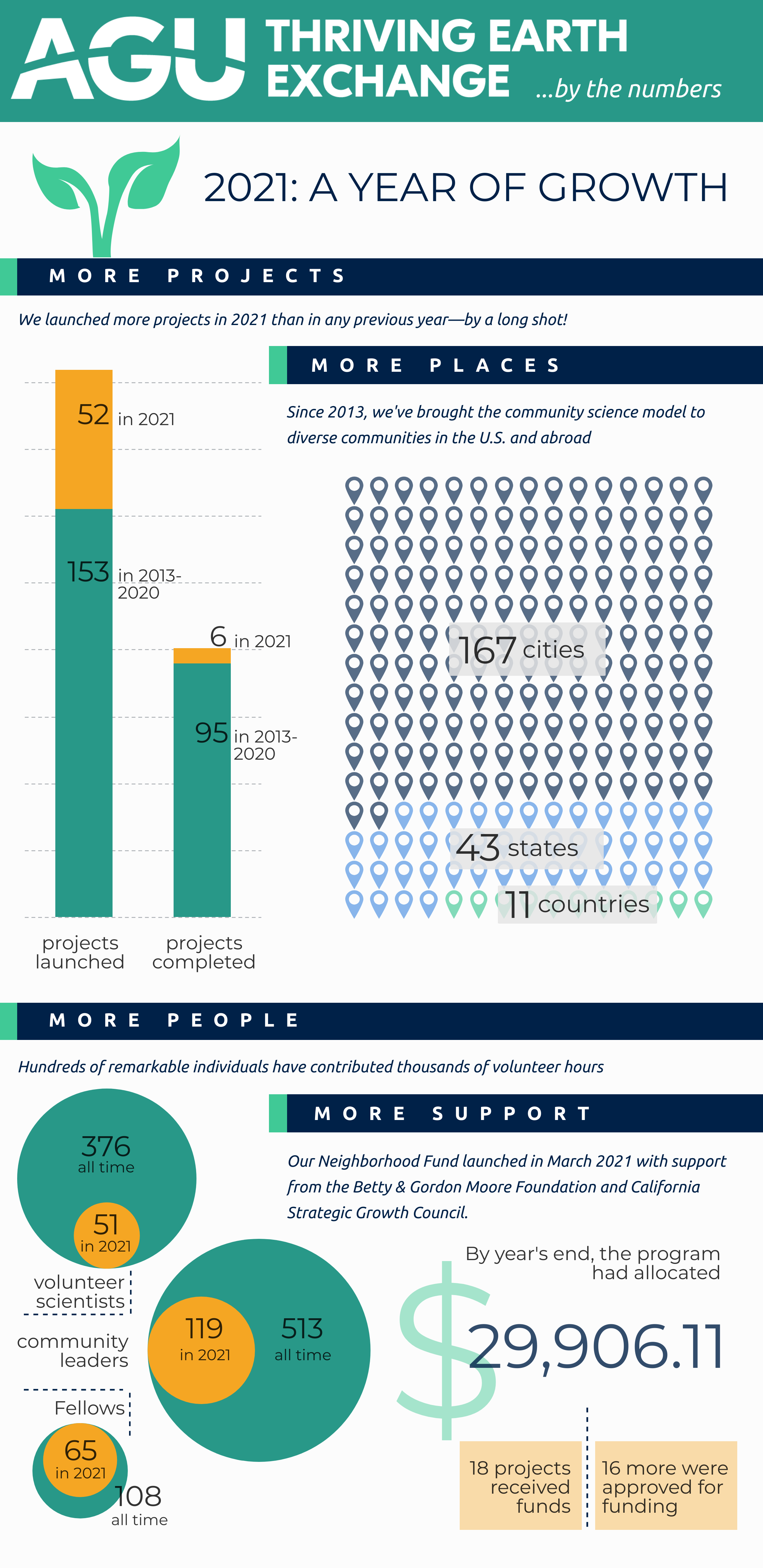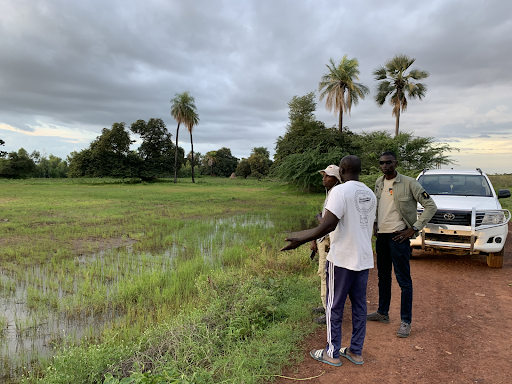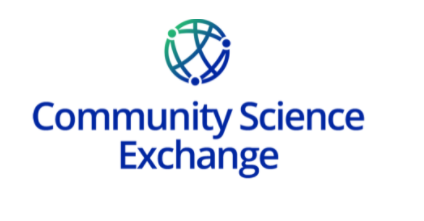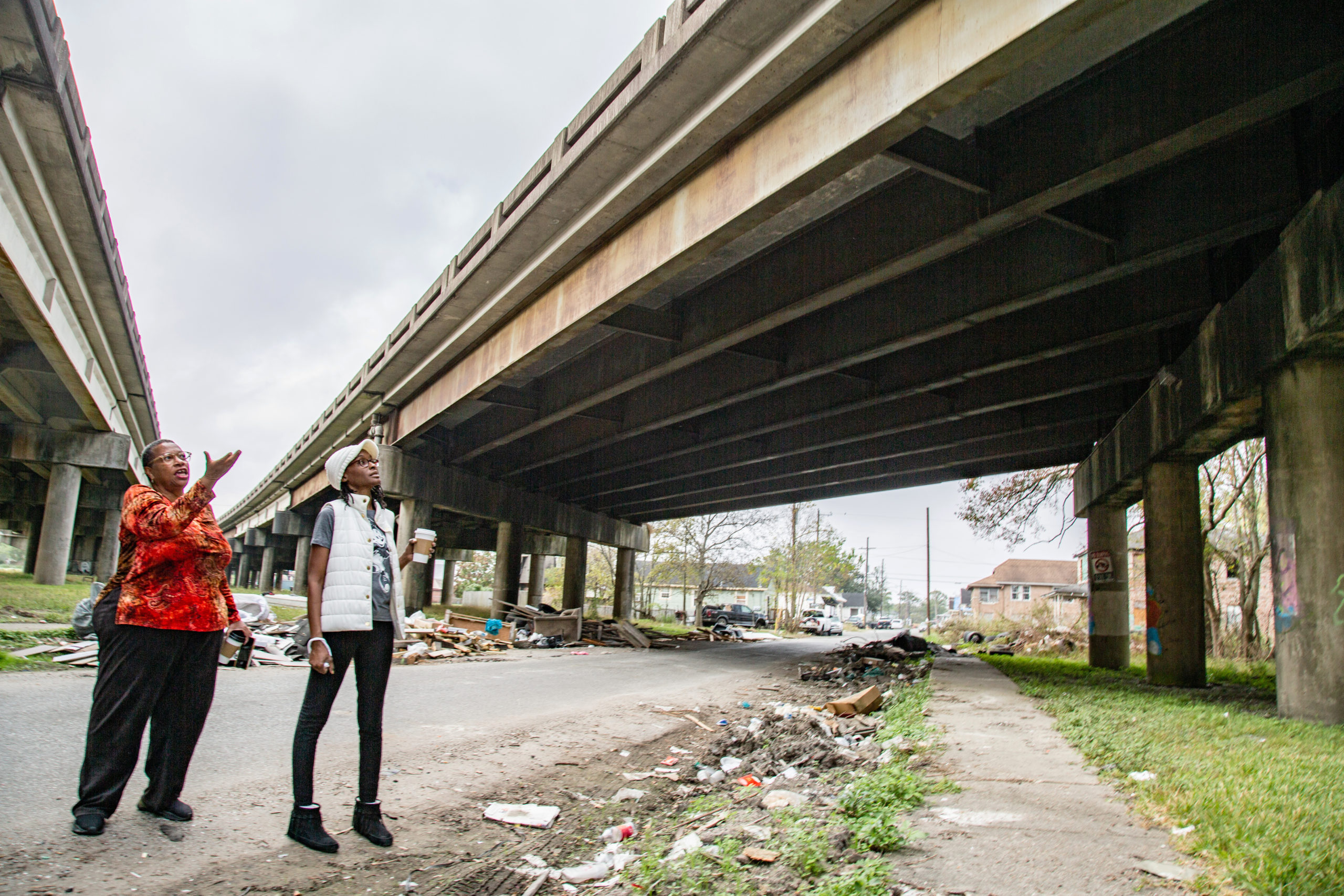2021 followed a year no one could have expected. Yet even as we continued to respond and adapt to the new reality of the ongoing pandemic, Thriving Earth Exchange found innovative ways to advance community science and spark new collaborations in the United States and around the world. This year, we launched a record number of projects and forged exciting new partnerships. We continued to grow our fellowship model, engaging more than 50 emerging community science leaders in impactful projects. We expanded how we define and source expertise, to include technical experts like engineers, planners and social scientists who make vital contributions to community science projects. And most importantly, community science is now recognized as a critical pathway to making science more equitable, inclusive and just (as evidenced by its role as a primary pillar of the #AGU21 theme, “Science is Society”). Below, we celebrate the people and projects that made 2021 a watershed year for Thriving Earth and community science.

Our Projects
In 2021, we launched a record number of projects in communities across the US and beyond. Check them out below and stay tuned as they progress!
Projects Launched in 2021
Projects completed in 2021
- Park City, Utah – Evaluating the effectiveness of biochar for carbon sequestration, soil productivity, water retention, and wildfire risk reduction
- Clark County, Washington – Assessing the impacts of volcanic rock mining on rural communities
- Melbourne, Florida – Evaluating urban stormwater drainage to create flood-resilient neighborhoods and gardens
- Frederick, Maryland – Updating precipitation forecasts for flooding events
- Charleston, South Carolina – Assessing the potential impact of new urban development on flooding
- San Diego, California – Leveraging community science to increase watershed education and restoration
Our Partners
Thriving Earth Exchange continues to strengthen our existing partnerships and forge new ones. We were proud to partner with the following organizations in 2021:
We are also excited to lay the groundwork for collaboration with the following groups in 2022:
Our People
Thriving Earth Exchange is driven by volunteers. Without the community leads who seek to use science to make their communities a better place to live, work and play; the scientists and technical experts who provide pro-bono time and expertise to advance community priorities; and the Community Science Fellows who facilitate projects and help keep them moving forward, we wouldn’t be here.
Fellows engaged in 2021
The commitment and passion of our volunteers is augmented by our supporters and champions, whose dedication shone through from our board, funding supporters the Gordon and Betty Moore Foundation & California Strategic Growth Council, and AGU leadership. 2021 also saw dedicated new staff members join our team as our program continues to grow and evolve.
Highlights from a Year of Growth
An appetite for community science
The culture of science—and its perceived role in society—is changing. With our focus on community-driven science, Thriving Earth welcomes and encourages these shifts. Our staff and project participants are increasingly being asked to share their experience and knowledge about how to cultivate equitable, impactful partnerships between communities and scientists.
In 2021, Thriving Earth staff were invited to share at over 35 international and U.S.-based events, including the American Meteorological Society Summer Policy Colloquium and the International City/County Management Association Annual Conference. Thriving Earth staff members also serve as advisors for organizations including C2P2, the Cornell Lab of Ornithology, the Denver Institute for Science and Policy, the Denver Sustainability Advisory Council Science and Research Standing Committee, Emerging Geoscience Scholars, FieldScope, IDEAL Citizen Science Working Group, ISET International, the LISTEN network, the NOISE project, Public Lab, SCoPEx, and and the EAGER research project “Equity on Scientific Co-production Processes: Creation of a Framework,” funded by the National Science Foundation’s Science of Science program.
Advancing community science across the globe

AJGES team members in the field. Photo credit: AJGES
The reach of Thriving Earth Exchange has long extended beyond our national borders. This year, we trained two new international partners on our community science approach: Hano Wene in Indonesia and the South Trelawny Environmental Agency in Jamaica. Look for updates on projects stemming from those collaborations in 2022! We also continued to build on existing partnerships with Future Earth Australia and the Association of Young Geologists and Environmentalists of Senegal (AJGES), which launched their first community science projects in Tallangatta, Victoria and Senegal’s Fatick region, respectively. In addition, we hosted a town hall event at AGU’s Fall Meeting in collaboration with Future Earth Australia, which we anticipate will encourage more Future Earth national committees to adapt community science in their activities.
In collaboration with the National Academies of Sciences, Engineering, and Medicine and USAID’s Partnerships in Enhanced Educational Research (PEER) program, we also hosted two webinars for Cambodian researchers on integrating community science principles into their work. USAID subsequently adapted Thriving Earth’s community agreements template as a key criteria for assessing proposals for USAID PEER grants and invited our team to present the results of the Cambodia webinars to USAID headquarters and other country teams in 2022.
Diversity, inclusion, equity and justice
Throughout this past year, we were heartened to witness a marked shift in the scientific community as more individuals and organizations embraced diversity, inclusion, equity and justice as celebrated tenets of the scientific endeavor. These values are central to the community science model, but they have not been universally appreciated by scientists and scientific organizations, who sometimes see them as diluting the emphasis on science, stepping into advocacy, or alienating some groups. At Thriving Earth Exchange, we are encouraged by this change and dedicated to making it stick. This work has taken a variety of forms:
- We’re expanding our engagement with communities of color, seeking resources to support community leaders and fellows who don’t have the resources to be volunteers, and continuing the Neighborhood Fund, which puts budgets for science into the hands of community leaders. We are also growing our communications and education capacity so that we can better amplify community stories.

The Community Science Exchange is a new, multi-faceted platform for networking and advancing community science practice and principles.
- This year we were instrumental in launching the new Community Science Platform, an initiative of AGU along with the American Anthropological Association, American Meteorological Society, American Public Health Association, Citizen Science Association, and Unión Geofísica Mexicana. The platform includes both a journal and a knowledge exchange to allow scientists and community leaders to contribute to, get credit for, and benefit from community-driven work.
- We have helped amplify community presence in AGU’s events portfolio, as exemplified in the itinerary for community science at Fall Meeting and AGU’s support for the Rhythms of the Land workshop and art exhibit.
- We participated in an effort to foreground indigenous knowledge and leadership within AGU, an effort that led to the establishment of AGU’s new Indigenous Action Committee.
Media moments
We were excited to see in-depth, thoughtful media coverage for several partner communities this year. In addition, our own blog and social media were extremely lively with project happenings and conversations. Here are a few highlights:
- In November 2021, we published an in-depth story on a project in Glastonbury, Connecticut investigating uranium in the town’s drinking water. It was featured in our display at #AGU21, and we plan to share it with partners past, current and future to demonstrate how Thriving Earth Exchange projects develop, weather challenges (like the COVID-19 pandemic) and benefit their communities long after they are complete. The team’s final report-out was featured in the Manchester Journal Enquirer. Stay tuned for more of these “marquee project stories” in 2022!
- Queen Quet, who is leader of the Gullah/Geechee Nation and serves as Thriving Earth Exchange community lead for a project on St. Helena Island, South Carolina, was interviewed for the powerful ABC Nightline Keepers of the Land story.
-

Community leads Amy Stelly and Tamah Yisrael stand under highway I-10 in the 7th Ward, December 2021. Photo credit: Beth Bagley/AGU
Northern California Public Radio published an excellent episode of its Living Downstream podcast on the Salton Sea and the scientists, students and community members who are striving to understand its impact on environmental and public health. The community is engaged in an ongoing Thriving Earth project, among other efforts.
- As the U.S. infrastructure bill took shape this year, inequitable development became a national conversation, with New Orleans’ Claiborne Avenue and the devastating impacts of Interstate 10 at its center. Thriving Earth project community lead Amy Stelly published an essay in the Washington post about her experience with the highway, and several major outlets took deep dives into highway removal.
In Their Own Words: Community Science Perspectives
To close out the year, we created a video featuring testimonials from our scientists, community leads, fellows and partners from South Dakota, Senegal, New Jersey, Jamaica, Mississippi, South Carolina, California and more. We hope you enjoy this brief reflection on a remarkable year and look forward to working with you in 2022!
